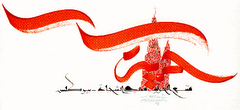Some shocking realties
In a recent visit to Paris, I had the opportunity of direct meetings with several thinkers, journalists and politicians. In this two-week visit, I had many surprises. One such surprise came in a meeting with the editor-in-chief of “Le Monde” newspaper, from listening to manner in which the well-known newspaper covers the news from Syria. In this meeting, the staff of the newspaper confirmed that the primary source of their coverage of the Syrian crisis comes from around 10 young Syrian men who, living in Paris, follow the Syrian news on Facebook.
Such an insight came with quite a shock. It is deplorable that this newspaper, which influences French public opinion and view-points elsewhere, principally gathers its news in such a manner. One can, of course, come out with two completely different opinions from any issue, not just the Syrian crisis. Indeed, anyone who uses Facebook is aware of the contradictory opinions and posts within one account, and so coming out with a conclusion requires some selectivity.
The point then is not about how to gather and present the news, but rather about the real purpose and agenda behind such processes. The case mentioned here does not relate exclusively to one news agency or newspaper, it is in fact representative of the malaise which is latent in today’s international media.
After approximately two years of spreading the news about the fall of Syria, and the level of disasters there, the world is now facing a new reality: terrorism, hate, killing, bloodshed, fear, and, above all, the risk of the wholesale destruction of the Syrian social tapestry. And all this for the sake of whom?
The culture of deception reaches far beyond the media, to include many “thinkers” and “intellectuals’’. Another shock in Paris came from meetings with some thinkers and novelists, who, shamefully, articulated an absurd vision of what the Arab world is going through. Those who confuse the concept of change with global destruction, should first learn the value of human life, and only then might they talk about saving life.
When a thinker designs a rosy picture of a bitter reality to achieve a goal linked to selfish interests, this should be considered a betrayal, not only against one’s own knowledge, but also of humanity.
Take for instance the example of a well known thinker who dedicates a lot of time trying to convince young Libyans of the need to give over a huge Libyan oil company (in the presence of its general-manager). This ‘thinker’ can in fact never be considered a thinker, since this is clearly not the mandate of a thinker, but the role of a money seeker.
In the end, such positive and negative experiences are useful. But the most constructive experience is that which exposes this masquerade, wherein cheap opportunists are being disguised under their label as ‘thinkers’.
Dr. Amer Al Sabaileh







Aucun commentaire:
Enregistrer un commentaire